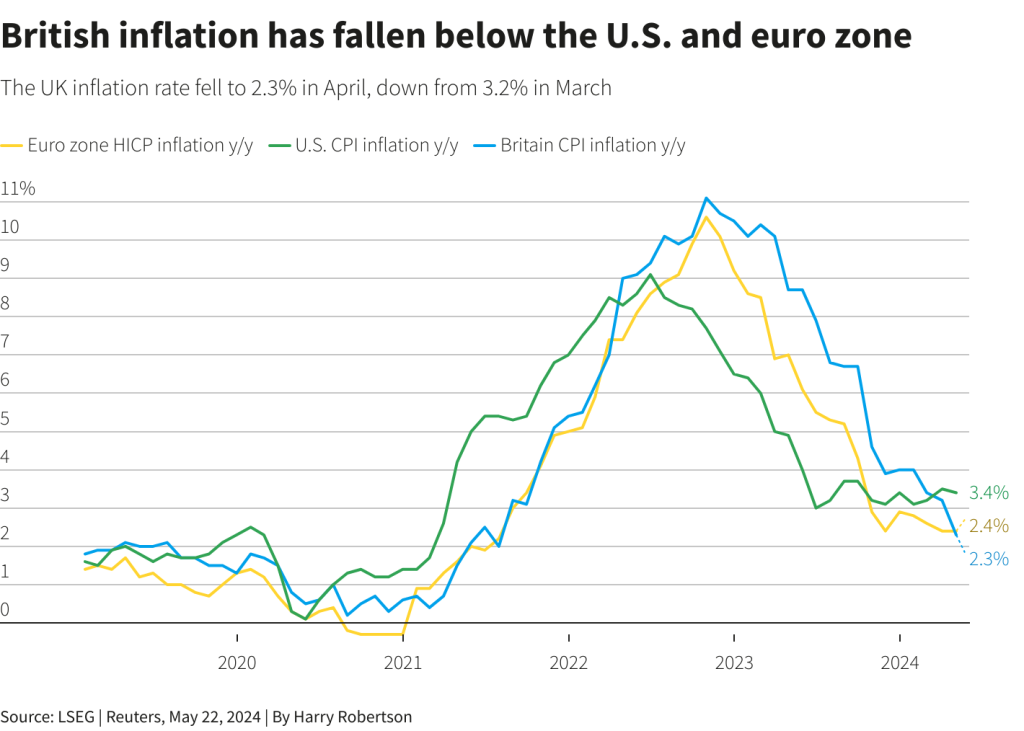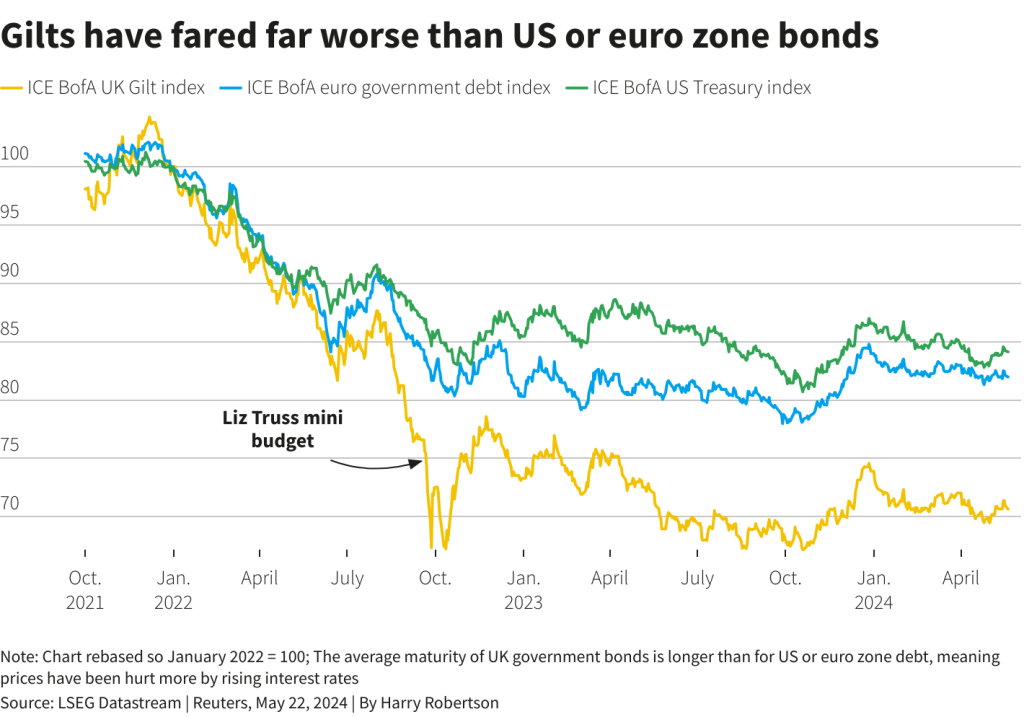A surprise British general election in July has removed a layer of uncertainty for UK markets, allowing investors to concentrate on the outlook for interest rates and the economy as the primary drivers of the pound, stocks, and bonds.
Prime Minister Rishi Sunak announced the general election for July 4 on Wednesday, following data that showed British inflation had fallen to 2.3% in April. Sunak hopes to leverage this economic improvement to boost the Conservative Party’s dismal polling numbers.
Most investors are operating under the assumption that Keir Starmer will become the next Prime Minister, as his opposition Labour Party consistently holds a 20% lead in the polls.
Both Sunak and Starmer share a common goal of maintaining market stability by avoiding major fiscal announcements that could disrupt the tentative calm. Analysts recall how former Prime Minister Liz Truss’s plans for significant tax cuts in 2022 caused a dramatic drop in UK government bonds and the pound due to fears of a soaring budget deficit.
UK markets have had a volatile three years, thanks to high inflation and Truss’s brief premiership, but have recently found a footing with the FTSE 100 (.FTSE), stock index at record highs, sterling rising and big investors buying government debt.
Sunak’s announcement on Wednesday pushed the pound slightly higher and stock futures a touch lower.

“This (election) is something that the market has been anticipating for a while,” said Emmanouil Karimalis, rates strategist at lender UBS. “The fact that this has been brought forward may be good for the market, considering there was some speculation about more fiscal stimulus before a likely autumn election.”
Also Read: Mike Lynch to Testify in US Fraud Trial Over ‘Massive’ Fraud
Karimalis said investors will pay particular attention to Labour’s plans but will continue to be influenced by the domestic and global economy.
“Bottom line, I do not foresee the general election campaign and vote impacting the gilt market in the coming weeks materially,” he said.
Ben Laidler, global markets strategist at trading platform eToro, said he sees similarities to former Labour Prime Minister Tony Blair’s landslide victory in 1997.
“Basically markets just rallied straight through that (election). There wasn’t a lot of policy change on the table and there wasn’t a lot of election uncertainty,” he said.
British stocks have hit record highs in recent weeks, along with their U.S. and European peers, boosted by hopes that interest rates are coming down, as well as a belief that UK companies are undervalued.
“Their (Labour’s) hands are tied a little bit by the lack of financial flexibility they’re going to have if they win,” Laidler said. “But the policy agenda is pro-renewables and pro-infrastructure…That could ultimately boost small-cap stocks.”
Sterling has risen around 2% so far this month thanks in part to surprisingly strong British growth data, a welcome sign for Sunak. Yet it has also been driven by inflation remaining hotter at home and in the U.S. and markets pushing back their bets on Bank of England (BoE) rate cuts.
DEBT PILE GROWING
The outlook for bond markets is of particular importance to the next prime minister as the government continues to borrow heavily in international markets and faces large interest costs after debt surged during the COVID-19 pandemic.
British debt has been hit hard over the last two years by a jump in interest rates and the Truss mini budget. An ICE BofA index of gilts (.MERG0L0), has dropped around 30% since 2022, compared to declines of less than 20% for euro zone government debt (.MEREG00), and U.S. Treasuries (.MERG0Q0),.

Britain is set to raise around 265 billion pounds ($337.66 billion) in the 2024/25 financial year, although there are few signs investors are balking at the second-biggest year of supply on record.
Ed Hutchings, head of rates at Aviva Investors, said the firm’s preference is to hold gilts ahead of U.S. and European debt, although it is a relatively cautious wager.
“The underlying growth rate in the UK has been that much weaker than the U.S.,” Hutchings said. He added that “fiscal expansion is probably more off the cards in the UK versus the U.S.”
Investors including Pimco, Amundi and Neuberger Berman have all recently said they like the outlook for gilts, with their focus on inflation and the BoE.
“The disinflation trend which started in 2023 remains intact,” said Jon Jonsson, a senior portfolio manager at asset manager Neuberger Berman. “The timing is uncertain, but the path is less important than the endpoint and the BoE should deliver over 200 basis points of easing over the next two years.”

